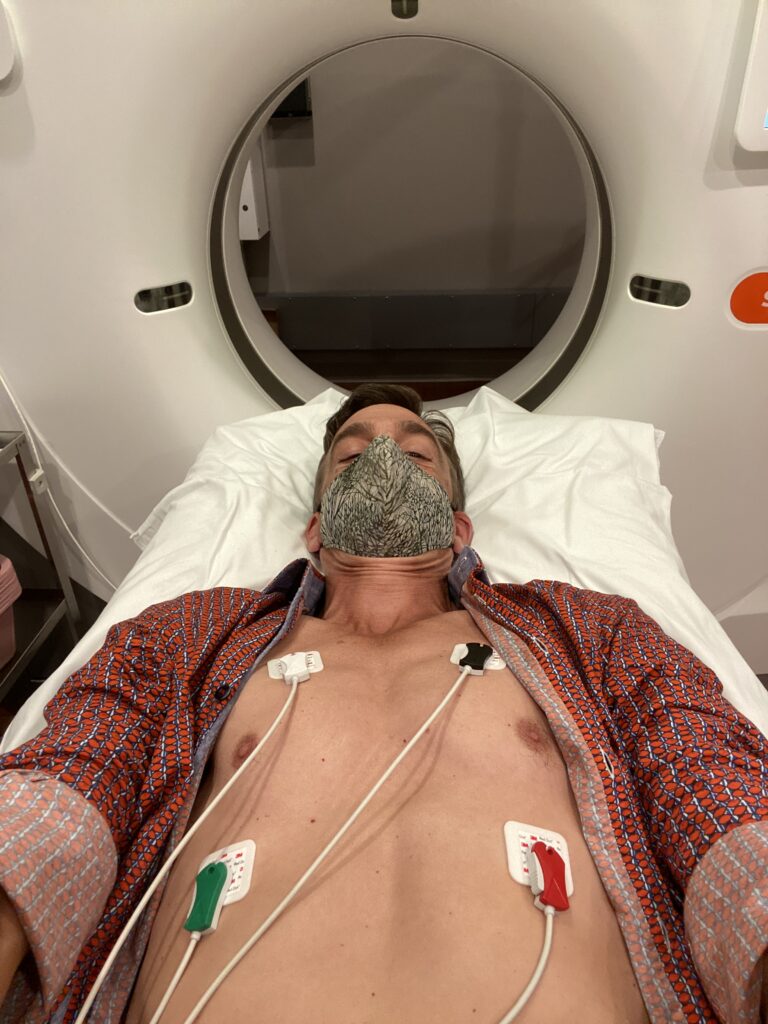What is the CAC score?
This is a simple test, via an inexpensive and rapid CT scan – done without dye or prep. The test takes less than ten minutes and the report calculates the amount of calcification embedded in the plaque that lies on the inner lining of the coronary arteries. The underlying process of calcified plaque goes like this.
Soft plaque forms as a bandage to the inner artery lining, perhaps in response to excessively high glucose or inflammation or irritants from smoking. But the process might also be driven by genetic factors as we see in people with elevated LP(a) or the APOe4 gene.
These soft plaques are waxy and, well, soft. Which makes them relatively unstable and capable of peeling off the artery wall. Which my friends is now called an embolus and if that drifting piece of plaque blocks blood flow it called an embolism. This is the cause of heart attacks and strokes.
Our body has many beautiful self-repair processes and here comes calcium. Calcification is a repair process whereby mineralization with calcium stabilizes soft plaques that have recently formed. The CAC score is therefore measuring the extent to which the stabilization and calcification of unstable plaque has taken place. Good thing, right?
Well, you need soft plaque to form first, before any resultant calcified plaque. This explains why elevated CAC scores are associated with higher risk of heart attacks and strokes over time. But as you might guess, rate of increase in CAC score is the real test, more on that below…
CAC of ZERO I took a test last year and my report was zero – I wrote a little about that here. This shows me that, into my mid-fifties, there has not yet been plaque production in my arteries that has required calcification. I don’t smoke, my blood sugars are in optimal range and inflammation tests are negative. Good – the blindly hopeful man in may believe I earned what some researchers coined a “15-year warrantee”, but my pessimistic side knows I am certainly capable of some other creative illness. And by the way – I can’t guess what a patient will be on their CAC score. I recently reviewed results of a 68 year old man with a decade of type 2 diabetes with an A1c hovering at 6.5-7.2% that whole time. His Cholesterol total remained between 275-300. His CAC score was zero. This kind of surprised me of course, but only because I, like most of us, have a bias toward what I see clinically. The fact is this bias is totally wrong much of the time. I run the CAC test with clients now more than ever.
CAC up to 100
What if my number were higher than zero…say 10-100? Well this is considered low but earns attention. When I see this low CAC score I dig for underlying cause. I look at the CRP and other inflammation measures. I look for high insulin / insulin resistance / slightly elevated blood sugar / TG:HDL of >1.5 /Heart Rate Variability / high blood pressure—basically I look to improve cardio-metabolic health and retest in 3-4 years.
CAC >100 HOW TO ASSESS RATE OF CAC INCREASE
If someone between 40-60 years of age has a CAC score of 200 or 800, it triggers the same response clinically. I want to see the rate of plaque formation. If someone is “running hot” and their blood vessels are a runaway train of soft-plaque formation, their CAC score will increase rapidly as their body races to stabilize the new plaques with calcium deposits. These people are at very high risk of future heart disease.
Let’s say one person has a CAC score of 400. Two years later their CAC score is 450. This person had an increase at about 7% per year.
Let’s say another person has the same CAC score of 400 and two years later their CAC score is 620. This represents an increase of 25% per year.
The risk of heart disease is many times greater in the person with the 25% annual increase. When rate of elevation is slow enough, the risk of future cardiac events dramatically decreases.
Does CAC score always go up?
If you are lucky enough to age, then yes, usually. For reference, About 60% of men between 45-55 years of age have a CAC score of zero. But of men 75-85 years old, barely 10% have a zero score.
The magic number in the research? Greater than 15% annual CAC score elevations indicate the biggest leap in future cardiac events. Therefore, rates of increase are best kept <15% per year to maintain lower CVD risk. Perhaps closer to 5% is even better, but in my reading, of those individuals with elevated CAC scores, keeping increases to 5-10% is success.
HOW OFTEN DO YOU RE-TEST A CAC SCORE?
If it is zero and there are no other risk factors, I retest in ten years.
If it is below 100, I work to identify probably triggers, I treat and retest in 3-4 years
If it is >100 I retest every 2-3 years depending upon age and treatments.
HOW TO FIND YOUR BEST TREATMENT for an ELEVATED CAC?
I could discuss many options here, but the post would be a few hundred pages. You should meet with a skilled practitioner to help you assess your individual “center of gravity”. Many considerations arise…blood pressure, blood sugar, nutritional status, inflammation status, fitness markers, genetic risk factors, and this is only a partial list. A well-versed practitioner will help you discover and address what really counts for you. There may be a reason to run more advanced tests like stress tests or angiograms (the dye enhanced X-Ray imaging of vascular blood flow that helps define extant of blockages in key coronary arteries.
There are many options to help you address metabolic issues, you can get The Blood Code book if your blood sugars and lipids are off. For now though, let’s get the assessment nailed down and save the treatment options for future consideration. CAC scores are the same at all radiology facilities. In the Northeast US, the score varies from $100 up to $800. I went to a facility that charged $99 – and was blown away at how professional they were and how quick the results were delivered. You don’t “get what you pay for” – so shop around your area. Most inexpensive locations are in the $150-$200 range.
https://youtube.com/shorts/kk9uCS87EIM?feature=share = this is a video post as I entered the radiology office.
Post your experience so your friends can learn about CAC scoring. I know this score is helpful, in part, to correct the medical fixation on cholesterol levels as the end-all metric for heart disease risk. THIS IS A LINK TO THE ULTA lab test panel that does the best job of looking at blood tests related to heart disease risk. https://www.ultalabtests.com/partners/bloodcode/test/blood-code-5-heart-risk-nutrition-metabolism-full





Comments are closed.